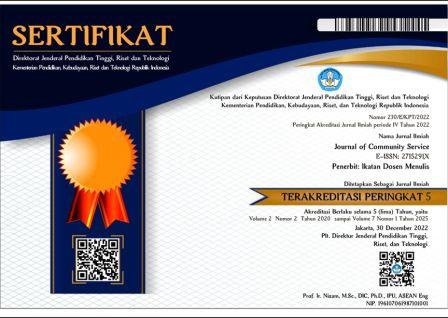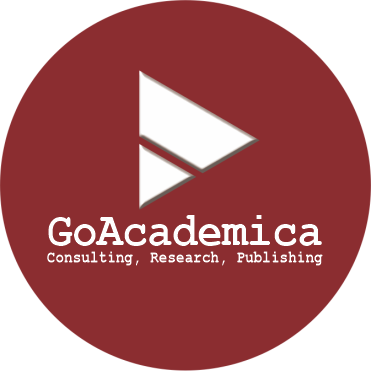Publication Ethnics
The following statements are based on Elsevier recommendations and Committee on Publication Ethics (COPE) Best Practice Guidelines for Journal Editors.
Journal of Community Service follows the COPE. Code of Conduct and Best Practice Guidelines for Journal Editors and the Code of Conduct for Journal Publishers.
Journal of Community Service is committed to upholding the highest standards of publication ethics and takes all possible measures against publication malpractice. Authors who submit papers to Register attest that their work is original and unpublished and is not under consideration for publication elsewhere. In addition, authors confirm that their paper is their own and that it has not been copied or plagiarized, in whole or in part, from other works. They have disclosed actual or potential conflicts of interest with their work or its partial benefits.
========================================================================================
DUTIES OF EDITORS
Decision on the Publication of Articles
The Editor in Chief of the Register is responsible for deciding which articles submitted to the journal should be published. The Editor in Chief may be guided by the policies of the journal's editorial board and subjected to such legal requirements regarding libel, copyright infringement, and plagiarism. The Editor in Chief may confer with other editors or reviewers in making this decision.
Review of Manuscripts
The Editor in Chief must ensure that each manuscript is initially evaluated by the editor/co-editor, who may use appropriate software to examine the originality of the contents of the manuscript. After passing this test, the manuscript is forwarded to two referees for blind peer review, and each of them will make a recommendation to publish the manuscript in its present form or to modify or reject the same. The review period will be from four weeks to one month (A maximum of two months in extraordinary circumstances).
Disclosure and Conflicts of Interest
Unpublished materials disclosed in a submitted manuscript must not be used by anyone who has a view of the manuscript in their research without the express written consent of the author.
Fair Play
The manuscript shall evaluate manuscripts solely on intellectual merit without regard to the author's race, gender, sexual orientation, religious belief, ethnic origin, citizenship, or political philosophy.
Confidentiality
The Editor in Chief/editors and any editorial staff must not disclose any information about a submitted manuscript to anyone other than the corresponding author, reviewers, potential reviewers, other editorial advisers, and the publisher.
========================================================================================
DUTIES OF REVIEWERS
Promptness
Suppose any reviewer feels that they can't complete the review of the manuscript within the stipulated time. In that case, the same must be communicated to the editor so that the same could send the same to any other reviewer.
Confidentiality
Information regarding manuscripts submitted by authors should be kept confidential and be treated as privileged information.
Standards of Objectivity
The review should conduct reviews objectively. There shall be no personal criticism of the author. Reviewers should express their views clearly with supporting arguments.
Acknowledgment of Sources
Reviewers should identify relevant published work that the authors have not cited. The relevant citation should accompany any statement that had been previously reported elsewhere. A reviewer should also call to the Editor in Chief's attention any substantial similarity or overlap between the manuscript under consideration and any other published paper they have personal knowledge of.
Conflict of Interest
Reviewers should not review manuscripts in which they have conflicts of interest resulting from competitive, collaborative, or other relationships or connections with the authors, companies, or institutions connected to the papers.
========================================================================================
DUTIES OF AUTHORS
Reporting Standards
Authors of reports of original research should present an accurate account of the work performed and an objective discussion of its significance. Underlying data should represent underlying data accurately in the paper. A paper should contain sufficient detail and references to permit others to replicate the work. Fraudulent or knowingly inaccurate statements constitute unethical behavior and are unacceptable.
Data Access and Retention
Authors may be asked to provide the raw data in connection with a paper for editorial review and should be prepared to provide public access to such, if practicable, and should, in any event, be prepared to retain such data for a reasonable time publication.
Originality and Plagiarism
Authors should ensure that they have written entirely original works, and if the authors have used the work or words of others, this must be appropriately cited or quoted.
Multiple Publications
An author should not, in general, publish manuscripts describing essentially the same research in more than one journal or primary publication. Submitting the same manuscript to more than one journal concurrently constitutes unethical publishing behavior and is unacceptable.
Acknowledgment of Sources
Proper acknowledgment of the work of others must always be given. Authors should cite publications that have been influential in determining the nature of the reported work.
Authorship of The Paper
Authorship should be limited to those who have contributed to the conception, design, execution, or interpretation of the reported study. All those who have made significant contributions should be listed as co-authors. Where others have participated in certain substantive aspects of the research project, they should be acknowledged or listed as contributors.
Disclosure and Conflicts of Interest
All authors should disclose in their manuscript any financial or another substantive conflict of interest that might be construed to influence the results or interpretation of their manuscript. All sources of financial support for the project should be disclosed.
Fundamental Errors in Published Works
When an author discovers a significant error or inaccuracy in their published work, they must promptly notify the journal editor or publisher and cooperate with the editor to retract or correct the paper.
========================================================================================
Plagiarism Notice
Journal of Community Service will use Turnitin's originality checking software to detect similarities of texts in article manuscripts and the final version of articles ready for publication. A maximum of 20% of similarities is allowed for the submitted papers. Should we find more than 20% of the similarity index, the article will be returned to the author for correction and resubmission.
Journal of Community Service wants to ensure that all authors are careful and comply with the standards of academic integrity, particularly on the issue of plagiarism.
Plagiarism occurs when an author takes ideas, information, or words from another source without proper credit to the source. Even unintentionally, plagiarism is still a serious academic violation and is unacceptable in academic publications.
A citation is required when the author learns specific information (a name, date, place, statistical number, or other detailed information) from a specific source. (This is only forgiven in cases of general knowledge, where the data is readily available in more than five sources or is common knowledge, e.g.)
When the author takes an idea from another author, a citation is required—even if the author develops the idea further. This might be an idea about interpreting the data, either what methodology to use or what conclusion to draw. It might be an idea about overall developments in a field or general information. Regardless of the idea, authors should cite their sources. In cases where the author develops the idea further, it is still necessary to cite the source of the idea, and then in a subsequent sentence, the author can explain their more developed idea.
When the author takes words from another author, citation and quotation marks are required. Whenever four or more consecutive words are identical to a source that the author has read, the author must use quotation marks to denote the use of another author’s original words; just a citation is no longer enough.
Journal of Community Service takes academic integrity very seriously. The editors reserve the right to withdraw acceptance from a paper found to violate any standards set out above.


















